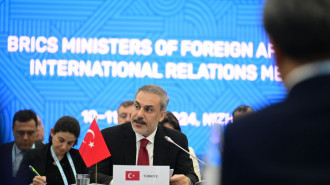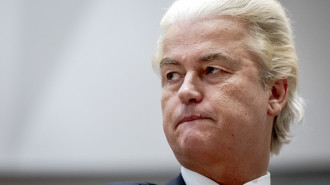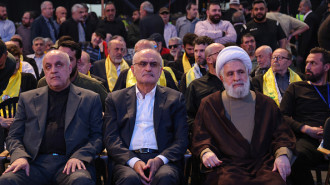UK counter-terrorism: A little carrot and lots of stick
Eight months later Majida Sarwar claimed the “police betrayed me” after her son Yusef was sentenced to 12 years in prison.
He duped his family so he could leave the country to go and fight in the ranks of the Kataeb al Muhajiroon Islamist militia against the government of President Bashar al Assad. When his mother read the note he left giving the real reason for his leaving, she informed the authorities.
| Engagement with the Muslim population was seen through the prism of a security threat |
The case of Majida and Yusef Sarwar reflects the complexities and contradictions of radicalisation in Britain and the government’s response to the problem.
A series of tough deterrence policies have been adopted while a troubled prevention and deradicalisation programme is being propped up. All the while there is a serious breakdown in relations between the authorities and many of the major Muslim organisations in the country.
Talking no nonsense
It is believed more than 500 British Muslims have gone to fight in the Syria and Iraq and this summer the threat from international terrorism in the UK was raised from substantial to severe.
The Home Secretary Theresa May reasoned that the successes of Islamic State group (IS, formerly ISIS) and its internationalisation of the conflict had given “energy and a renewed sense of purpose to subversive Islamist organisations and radical leaders” in Britain.
“There always hawks and doves in any administration and that is why we are seeing mixed messages right now,” said Usama Hasan, senior researcher at the Quilliam Foundation, a think tank founded by former radical Islamists who now promote pluralism.
In late November the government put forward a Counter-Terrorism and Security Bill introducing the first major coercive powers since 2010 such as barring the return or ‘terrorists’, preventing the travel of suspected militants and creating powers to relocate and limit the movements of potential extremists.
Days before the legislation was put to parliament the Home Secretary championed her government’s track record of having arrested 753 people on terrorism related offenses, extradited 13 people accused or convicted of terrorism related offenses and removed a number of people “because of the terrorist threat they posed.”
The message was clear. This is a no nonsense government that is going to be tough on extremists.
A neglect to prevent
In the same speech at the Royal Services Institute, May outlined that her government had significantly reformed the ‘Prevent‘ pillar of the counter terrorism strategy.
First adopted in 2007 under the Labour government, Prevent aims to, “stop people becoming terrorists or supporting terrorism”, including activities such as blocking "apologists for terrorism" from coming to the UK, supporting community campaigns which oppose extremism and mentoring individuals who are "at risk of being drawn into terrorist activity".
However, a number of major Muslim organisations have criticised the programme and a recent intelligence report noted its neglect. Fusilier Lee Rigby, a member of the British armed forces, was hacked to death on the streets of South London by two ‘home-grown’ Islamist extremists in May 2013.
| There is a serious vacuum in the government’s relationship with Muslim organisations and the community |
An official report into his death by the Intelligence and Security Committee of Parliament found the Prevent programmes, “have not been given sufficient priority as a means of tackling the problem of those attracted by radical Islamist and terrorist ideologies. We have the impression that this mirrors the relatively low priority (and funding) given to Prevent.”
James Brandon, associate fellow at the International Center for the Study of Radicalisation and Political Violence (ICSR) calculated nationwide spending on core Prevent work in 2013-2014 was a mere £1.7 million, compared to £17 million the previous year and £140 million at its peak in 2008-2009.
Neither the Home Office nor the police made themselves available for al Araby al Jadeed’s interview requests to respond to these findings.
“In any case, most of the financing never saw the light of day at the street level,” complained Ishtiaq Ahmed, media advisor to the Council of Mosques.
The Prevent programmes are managed by local authorities but many of them have not put their weight behind the initiative. The programme was also hampered from the get-go by suspicion and resistance from a number of prominent Muslim community leaders and organisations.
“Engagement with the Muslim population was seen through the prism of a security threat which undermined trust and confidence. Even if intention was not to target the whole community that is the impression it gave,” explained Talha Ahmad, chair of the Muslim Council of Britain’s (MCB) education task force.
The MCB used to have the ear of government but along with many other mosques and community groups the dialogue has gone cold. Several figures from these organisations told al Araby al Jadeed that the government just wanted them to rubber stamp all of their initiatives.
A communication vacuum
“There was far too little consultation and whenever there were voices of dissent they were side stepped. Now, there is a serious vacuum in the government’s relationship with Muslim organisations and the community,” noted Ishtiaq Ahmed.
Other observers point to the Islamist movements such as Jemaat-e-Islaami and the Muslim Brotherhood, and the influence they won over organisations associated with Prevent, as having played a pivotal role in the government’s decision to distance itself from them.
Bodies that were created as part of Prevent and bankrolled by the government soon came under the control of groups with organisational and ideological connections to movements that sat somewhat uneasily with the policy makers in government.
| There is a lot of denial about the common links between orgnisations and the likes of Jemaat-e-Islami and the Muslim Brotherhood |
In 2010 a report by the Quilliam Foundation was leaked to the press claiming the majority of mainstream Muslim organisations in the UK were non-violent Islamists whose ideology is “broadly the same as that of violent islamists,” and went on to add, “they disagree only on tactics."
The paper, which had not been intended for public view, warned that if the government engaged with these groups it risked “empowering proponents of the ideology, if not the methodology, that is behind terrorism.”
The cat was well and truly among the pigeons.
The Quilliam Foundation came under considerable attack and remains divisive among many Muslim communities. Accusations of being too close to the ‘establishment’ and having little support at a grass roots level are regularly leveled against it.
Usama Hasan used to be a highly active figure in the UK Salfist movement and went to fight in Afghanistan against the Soviets in the 1980s.
He responded to the charges against Quilliam; “We stand by the letter. We didn’t advocate banning these groups but there is a lot of denial about the common links between organisations and the likes of Jemaah Islamiyeh and the Muslim Brotherhood and these organisations tend to be better organised and receive lots of money from places like Saudi Arabia, Qatar, Kuwait and elsewhere.”
In May’s speech last month she reiterated many of the sentiments advocated in the 2010 Quilliam report.
She asserted Prevent would focus on non-violent extremism as well as violent extremism and new procedures would be introduced to “make sure we only work with organisations that respect British values and public funding does not find its way to extremist organisations.”
A core part of Prevent aimed at identifying and “de-programming” late stage “radicalising” individuals is still running but much of the programme is effectively in limbo.







 Follow the Middle East's top stories in English at The New Arab on Google News
Follow the Middle East's top stories in English at The New Arab on Google News


